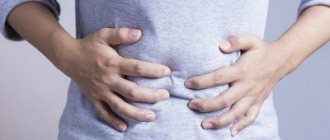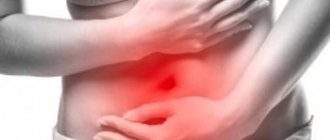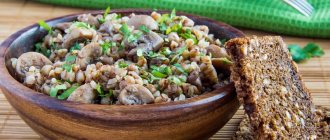Overeating can be accompanied by several unpleasant consequences, and most often they occur simultaneously.
- Feeling of fullness in the stomach, pressing pain, in rare cases - cutting;
- Belching;
- Heartburn;
- Bloating, increased gas production;
- General weakness, often accompanied by nausea and drowsiness.
The situation is aggravated if you overeat not just one product, but too many types of dishes that do not combine with each other, as well as with the parallel use of alcohol, even in small doses.
For a healthy body, the consequences will not be very serious, however, if there are problems in your body, it will be difficult to cope with the symptoms of overeating naturally. Unpleasant sensations can last for several hours, and sometimes even make themselves felt the next day: the consequences of overeating can be similar to a hangover.
We highlight the main symptoms
The sensations accompanying heaviness in the stomach directly depend on the etiology of its occurrence.
Stomach discomfort after eating is often combined with other symptoms that may indicate the presence of gastrointestinal diseases. For example, heaviness and pain in the upper abdomen can be manifestations of gastritis and stomach ulcers. The likelihood of having these pathologies increases if these symptoms occur on an empty stomach, and after eating they weaken or disappear completely.
Heaviness and pain in the stomach can be localized in the area around the navel and occur 30-60 minutes after eating. Such phenomena rather indicate the presence of inflammatory pathology of the small intestine. They are often accompanied by diarrhea, weight loss, and deterioration in general well-being, which also indicates intoxication of the body.
The presence of bloating and flatulence is not only the result of drinking carbonated drinks, but can also indicate diseases associated with impaired digestion or absorption of nutrients. For example, these symptoms occur with celiac disease and lactose intolerance. In such cases, the patient is advised to follow a diet that excludes foods that cause symptoms.
Heaviness in the stomach and belching appear after eating poor-quality food or due to overeating, as well as with decreased motility of the gastrointestinal tract. An example of such a pathology is gastroesophageal reflux disease. In this case, the onset of symptoms is noted after eating, and the manifestations of the disease intensify in the lying position. Treatment includes diet therapy and the use of prokinetics - drugs that enhance gastric motility. Rumbling and flatulence, accompanied by cramps in the stomach, are a consequence of dysbacteriosis.
To avoid discomfort and progression of the disease, you first need to reconsider your food intake.
Heaviness and pain in the abdomen leads to a decrease in the quality of life, the inability to concentrate on important matters, decreased performance, decreased appetite, and weight loss.
You should immediately consult a doctor if the following symptoms occur due to severity:
- repeated vomiting;
- high body temperature;
- diarrhea, green or bloody stools;
- severe abdominal pain or frequent stomach cramps.
Emergency help for overeating
If you've eaten too much and feel unwell, it's best to take emergency action within 30 minutes of eating too much. This way you will significantly reduce the recovery time and relieve the body.
After a heavy meal, the body will need help.
Take an enzyme supplement. Remember that this group of medications should not be used without a doctor’s recommendation and can be used once as an emergency measure, so if possible, contact your doctor and clarify the need to take the drug and the optimal dosage.
When you abuse products that do not combine well with each other, a very delicate problem often arises - increased gas formation and, as a result, bloating. This is exactly the case when you cannot restrain yourself. To make it easier to pass gas, you can take a knee-elbow position and relax your abdominal muscles.
Try to go to the toilet and empty your bowels. This won't relieve all the symptoms of overeating, but it will definitely make you feel a little better physically.
In the first hours after eating too much food, do not drink too much plain water. Give preference to drinks that increase the secretion of gastric juice and improve digestion.
- Natural black coffee without additives;
- Tea with ginger;
- Tea with lemon;
- A glass of warm water with 1 tsp. apple cider vinegar;
- A decoction of calamus or yarrow root;
Causes of heaviness and cramps in the stomach
This condition can occur at any time of the day. The main causes of heaviness in the stomach after eating are eating disorders:
- Irregular eating. The norm is to take small portions 4-6 times a day.
- Snacking on the spot, dry food, or replacing full-fledged hot meals with semi-finished products and fast food can cause stomach pain after eating. Incompatible or poorly digestible foods containing large amounts of fat or hot spices greatly irritate the stomach.
- Overeating, especially before bed. Gastric juice does not have time to process a large amount of food, and part of it is sent to the duodenum undigested.
Unnatural sensations in the stomach in the morning occur due to various reasons, including:
- taking medications that affect the functionality of the gastrointestinal tract;
- disruption of the functioning of certain organs (liver, stomach, pancreas);
- bad habits – alcohol, smoking;
- uncontrolled consumption of sweet carbonated drinks;
- stressful situations.
A separate group includes diseases of the digestive system, in which there is a high probability of heaviness in the stomach:
- gastritis;
- ulcer;
- hepatitis;
- cirrhosis;
- oncology;
- pancreatitis;
- cholelithiasis.
The course of such pathologies must be monitored by a doctor.
A separate issue is heaviness in the stomach during pregnancy. The child, increasing in size, puts pressure on many internal organs, including the stomach, causing a feeling of heaviness and heartburn. Often no intervention is required, everything goes away on its own after childbirth.
What not to do when overeating
Since many people experience overeating quite often, there are many stereotypes around this problem, some of which are not just meaningless, but even harmful. These myths are based on ignorance, so you should absolutely not follow them.
- Drink a digestif - alcohol “for digestion.” Perhaps this advice can be considered the most harmful. Treating anything with alcohol is already a crime against health, since alcohol in any quantity is an absolute poison for the body. While your internal organs are trying to cope with the huge amount of food eaten, you add another problem to them - alcohol intoxication. And among other things, alcoholic drinks are very high in calories.
- Move actively. If you consume a lot of high-calorie foods during a holiday feast, the first thing your loved ones will probably advise you to do is “shake yourself up.” There is only a drop of truth in this wish: indeed, to improve intestinal motility, a leisurely walk in the fresh air is recommended. At the same time, intense exercise, for example, energetic dancing, is completely contraindicated. This can negatively affect your heart function, causing nausea and dizziness.
- Go to sleep. It is quite possible that overeating will provoke unbearable drowsiness or simply a desire to lie down. This is not worth doing, since the food will take much longer to digest, the body will not rest properly, and the next morning you will wake up with unpleasant sensations in the body and a headache. After eating a large meal, refrain from sleep for at least 3-4 hours, spending this time in moderate activity.
What tests and studies need to be done to make a diagnosis?
To find out the cause of this symptom, it is necessary to carry out a number of diagnostic procedures. To determine the functional state of the patient’s digestive system, the doctor prescribes laboratory and instrumental studies.
In the first group, stool analysis is of greatest importance. Changes in its indicators may indicate a violation of the liver, insufficiency of digestive enzymes. If there is a suspicion of the infectious nature of the disease, a bacteriological study is carried out, which makes it possible to determine the causative agent.
Among the instrumental methods, ultrasound of the abdominal organs is most often used. It allows you to roughly assess the condition of the digestive system.
If gastritis and peptic ulcer of the stomach and duodenum are suspected, an FGDS is performed. A special tube is inserted into the patient's esophagus, at the end of which a camera with a light is attached. The doctor gradually carries it up to the duodenum and visually assesses the condition of the mucous membrane of the digestive tract. This way you can determine the presence of inflammatory changes, loss of integrity and other signs of pathology. In some cases, during an FGDS, the doctor takes material for a biopsy - pinches off a microscopic piece of tissue, which is then examined under a microscope.
What you need to know about treating heaviness in the stomach
The presence of symptoms for a long time is a reason to seek advice from a gastroenterologist. During the consultation, the specialist performs the following actions:
- studying the patient's condition;
- collection of tests;
- X-ray and ultrasound of the abdominal organs;
- examination of the stomach and duodenum using a special method - video endoscopy;
- magnetic resonance imaging.
Some signs may indicate serious problems with the digestive system.
First of all, an investigative connection must be established. If you experience heaviness and frequent pain in the stomach after eating, you should pay more attention to your diet, differentiate between breakfast, lunch and dinner, and exclude too fatty, salty and spicy foods from your meals.
The full list of studies is determined individually. After receiving all the data, treatment is prescribed taking into account the characteristics of the individual patient. To eliminate the feeling of heaviness in the hypogastrium, use:
- diet therapy;
- drug treatment, in particular herbal preparations, for example, GastroMix;
- surgical intervention - prescribed for serious illnesses.
What does the doctor think?
“For stomach diseases, it is not recommended to resort to treatment with antibiotics, because this can cause complications on the liver and kidneys.”
Under no circumstances should you self-medicate for discomfort, heaviness and pain in the stomach. Professional diagnosis and timely initiation of therapy will help eliminate complications and progression of pathologies that provoked an untidy symptom. To make your stomach work like a clock, you need... read our article.
The day after overeating
The main mistake is to fast the day after overeating. If you ate too much the day before, your stomach is stretched, and the process of digesting yesterday's food is still ongoing. Your task is to alleviate your condition and help your body, and not punish it with new stress.
Drink as much water, herbal or green tea as possible. It is not forbidden to drink a cup of strong coffee, but not on an empty stomach.
It is best to make breakfast quite light but satisfying. The best option is unsweetened porridge and egg white omelet. Try not to eat meat, mushrooms, fatty sauces, flour, sweets, fried foods, or animal fats in the first half of the day, so as not to burden the body even more. Give preference to fresh vegetables and fruits, bran yogurt, and vegetable soups. However, you shouldn’t overeat even healthy food: eat small portions every 2-3 hours.
If you don't feel like eating at all, which often happens the day after overeating, don't leave your stomach empty, otherwise you will feel sick. Try to eat something very filling, but small in volume, for example, a handful of nuts, dried fruits or a few slices of dark chocolate.
Herbal tea will help with overeating.
Right now you can move actively, walk, play sports, and end the day with a light dinner. After all the measures taken, you will forget about yesterday’s overeating and will more easily get into your usual rhythm.








